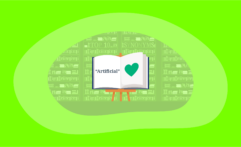Top 10 Positive & Impactful Synonyms for “Artificial Intelligence” (With Meanings & Examples)
Affiliate Disclosure
Hey fellow impactful ninja ?
You may have noticed that Impactful Ninja is all about providing helpful information to make a positive impact on the world and society. And that we love to link back to where we found all the information for each of our posts.
Most of these links are informational-based for you to check out their primary sources with one click.
But some of these links are so-called "affiliate links" to products that we recommend.
Why do we add these product links?
First and foremost, because we believe that they add value to you. For example, when we wrote a post about the environmental impact of long showers, we came across an EPA recommendation to use WaterSense showerheads. So we linked to where you can find them. Or, for many of our posts, we also link to our favorite books on that topic so that you can get a much more holistic overview than one single blog post could provide.
And when there is an affiliate program for these products, we sign up for it. For example, as Amazon Associates, we earn from qualifying purchases.
What do these affiliate links mean for you?
First, and most importantly, we still only recommend products that we believe add value for you.
When you buy something through one of our affiliate links, we may earn a small commission - but at no additional costs to you.
And when you buy something through a link that is not an affiliate link, we won’t receive any commission but we’ll still be happy to have helped you.
What do these affiliate links mean for us?
When we find products that we believe add value to you and the seller has an affiliate program, we sign up for it.
When you buy something through one of our affiliate links, we may earn a small commission (at no extra costs to you).
And at this point in time, all money is reinvested in sharing the most helpful content with you. This includes all operating costs for running this site and the content creation itself.
What does this mean for me personally?
You may have noticed by the way Impactful Ninja is operated that money is not the driving factor behind it. It is a passion project of mine and I love to share helpful information with you to make a positive impact on the world and society. However, it's a project in that I invest a lot of time and also quite some money.
Eventually, my dream is to one day turn this passion project into my full-time job and provide even more helpful information. But that's still a long time to go.
Stay impactful,
Digital minds, thinking machines, and virtual brains—positive and impactful synonyms for “artificial intelligence” enhance your vocabulary and help you foster a mindset geared toward making a positive impact. So, we had to ask: What are the top ten positive & impactful synonyms for “artificial intelligence”?
The top 10 positive & impactful synonyms for “artificial intelligence” are digital minds, smart systems, cognitive computing, intelligent agents, thinking machines, virtual brains, synthetic intellect, automated reasoning, computational minds, and AI innovators. Using these synonyms helps you enhance both your communication and psychological resilience in several meaningful ways.
In the table below, you can see all these top ten synonyms including their descriptions, why they are positive and impactful synonyms for “artificial intelligence,” and example sentences that highlight how you can use each of these. We’ll then also share ten benefits of why you should use these synonyms, ten interesting facts about the word “artificial intelligence,” and a brief history of the development of our alphabet.
Here Are the Top 10 Positive & Impactful Synonyms for “Artificial Intelligence”
Our list of positive & impactful synonyms for “artificial intelligence” help you expand your vocabulary and enhance both your communication and psychological resilience in several meaningful ways (you can read more about it in the next section).
That’s why it’s so important to focus on synonyms that can be used in a positive and impactful way.
Artificial Intelligence: the theory and development of computer systems able to perform tasks normally requiring human intelligence, such as visual perception, speech recognition, decision-making, and translation between languages
Oxford Dictionary
Our top ten synonyms for “artificial intelligence” exemplify the beauty of our language—their meaning is not just fixed but can be shaped by the context they are used in.
| Synonym | Description | Example Sentence |
| Digital Minds | Intelligent entities created through computer technology, similar to ‘Artificial Intelligence’ as it emphasizes the intellectual capacity created artificially. | “The digital minds developed for the project can process and analyze data faster than ever before.” |
| Smart Systems | Advanced computational systems capable of performing tasks that require human-like intelligence, highlighting the efficiency and adaptability akin to ‘Artificial Intelligence’. | “Our company has implemented smart systems to improve customer service and operational efficiency.” |
| Cognitive Computing | Computing systems that mimic human brain functioning, akin to ‘Artificial Intelligence’ by emphasizing the simulation of human thought processes. | “Cognitive computing is revolutionizing the way we interact with our devices, making them more intuitive.” |
| Intelligent Agents | Autonomous entities that observe and act upon their environment, parallel to ‘Artificial Intelligence’ with a focus on autonomy and decision-making capability. | “Intelligent agents are now used in various sectors to automate complex decision-making processes.” |
| Thinking Machines | Machines capable of processing information in a way that resembles human thought, similar to ‘Artificial Intelligence’ in their ability to reason and learn. | “Thinking machines are at the forefront of research in fields ranging from medicine to space exploration.” |
| Virtual Brains | Simulated neural networks that replicate human cognitive functions, echoing ‘Artificial Intelligence’ in their replication of human intelligence. | “Virtual brains are helping scientists understand more about human cognition and memory.” |
| Synthetic Intellect | Intellect developed through artificial means, akin to ‘Artificial Intelligence’ with an emphasis on the artificial creation of cognitive abilities. | “The development of synthetic intellect has opened new possibilities in the creation of responsive environments.” |
| Automated Reasoning | The capability of machines to reason and solve problems automatically, highlighting the logical aspect of ‘Artificial Intelligence’. | “Automated reasoning systems have significantly improved efficiency in legal research and analysis.” |
| Computational Minds | Minds that operate based on computational principles, similar to ‘Artificial Intelligence’ in their foundation on computing technology for intelligence. | “Computational minds have revolutionized problem-solving in complex domains like climate modeling.” |
| AI Innovators | Cutting-edge technologies that lead in the development of AI, paralleling ‘Artificial Intelligence’ with a focus on innovation and advancement. | “AI innovators are shaping the future of technology, driving progress in every sector.” |
10 Benefits of Using More Positive & Impactful Synonyms
Our positive & impactful synonyms for “artificial intelligence” help you expand your vocabulary and enhance both your communication and psychological resilience in several meaningful ways:
- Encouraging Positive Framing: Using positive synonyms allows for a more optimistic and affirmative way of expressing thoughts. This can influence not only the speaker’s or writer’s mindset but also positively impact the audience’s perception and reaction.
- Improving Emotional Intelligence: Learning different positive synonyms helps in accurately expressing emotions. This aids in emotional intelligence, as one can more precisely convey feelings and understand the emotions of others.
- Enhancing Persuasive Communication: In persuasive writing and speaking, using positive synonyms can be more effective in convincing an audience, as people generally respond better to positive language.
- Broadening Emotional Vocabulary: A range of positive synonyms enriches your emotional vocabulary. It’s one thing to say you’re “happy” and another to express that you’re “elated,” “joyful,” or “content.” Each word carries a unique emotional hue.
- Creating a Positive Atmosphere: The use of positive language can create a more constructive and encouraging atmosphere in both personal and professional settings. This can lead to better teamwork, more effective communication, and improved interpersonal relationships.
- Enhancing Creative Writing: For those engaged in creative writing, a repertoire of positive synonyms can help in vividly depicting scenes, characters, and emotions, making the narrative more engaging and lively.
- Improving Mental Health and Well-being: Regularly using and thinking in terms of positive words can influence one’s mental state and outlook on life. Positive language has been linked to greater well-being and a more optimistic outlook.
- Improving Cognitive Flexibility: Expanding your vocabulary with positive synonyms enhances your cognitive flexibility. This means you become more adept at thinking creatively and adapting your language use to different situations. The mental exercise involved in learning and using a variety of positive words can also contribute to overall cognitive health, keeping your mind sharp and responsive.
- Building Social Skills and Empathy: When you have a variety of positive words at your disposal, you’re better equipped to offer compliments, encouragement, and empathetic responses in social interactions.
- Facilitating Conflict Resolution: In situations of conflict, the use of positive language can help de-escalate tension. Having a range of positive synonyms allows for more constructive and diplomatic communication.
Overall, your use of positive synonyms not only broadens your vocabulary but also positively influences your thought processes, emotional expression, and interpersonal interactions.
10 Interesting Facts About the Phrase “Artificial Intelligence”
Let’s take a step back and have a look at some interesting facts about the word “artificial intelligence”.
- Etymology of “Artificial”: The word “artificial” comes from the Latin “artificialis,” meaning made by art, skill, or labor. It emphasizes the concept of something being created or made through human skill and ingenuity.
- Etymology of “Intelligence”: “Intelligence” derives from the Latin “intelligentia,” from “intelligere,” meaning to understand or perceive. This term underscores the ability to learn, understand, and apply knowledge.
- Origins of AI Concept: The concept of artificial beings with intelligence dates back to ancient myths and legends, but the modern concept of AI began to form in the 20th century with the development of computing technology.
- The Turing Test: Proposed by Alan Turing in 1950, the Turing Test is a criterion of intelligence in which a machine could be considered intelligent if it could imitate human responses under certain conditions, highlighting the challenge of distinguishing between human and machine intelligence.
- First AI Program: The first working AI programs were developed in the 1950s at universities such as the Massachusetts Institute of Technology (MIT). These early programs could play checkers or solve algebra problems.
- Machine Learning: A significant breakthrough in AI, machine learning involves the development of algorithms that allow computers to learn from and make decisions based on data, marking a shift from pre-programmed tasks to adaptive learning.
- AI in Chess: In 1997, IBM’s Deep Blue became the first computer chess-playing system to beat a reigning world chess champion, Garry Kasparov, demonstrating the potential of AI in performing complex tasks.
- Neural Networks: Inspired by the human brain’s structure, neural networks are a key technology in AI, enabling capabilities such as image and speech recognition, and fueling advancements in deep learning.
- AI Ethics and Philosophy: The rise of AI has led to new fields of study in ethics and philosophy, focusing on questions of machine consciousness, AI rights, and the moral implications of creating intelligent beings.
- Future Prospects: AI continues to evolve, with research focusing on achieving general AI, machines that can perform any intellectual task that a human being can, raising both anticipation and concerns about the future relationship between humans and machines.
A Brief History of Our Alphabet
The story of our alphabet has a rich and compelling history, beginning with ancient civilizations and carrying forward into the present day.
The history of our modern alphabet is a fascinating journey that spans several millennia and cultures. It’s commonly referred to as the Latin or Roman alphabet, and here’s a brief overview of its evolution:
- Phoenician Alphabet (circa 1050 BCE): The story begins with the Phoenician alphabet, one of the oldest writing systems known to use a one-to-one correspondence between sounds and symbols. This Semitic alphabet had about 22 consonants, but no vowels, and was primarily used for trade.
- Greek Alphabet (circa 800 BCE): The Greeks borrowed and adapted the Phoenician script. Crucially, they introduced vowels, making it one of the first true alphabets where each symbol represented a distinct sound (both vowel and consonant). The Greek alphabet had a significant influence on the development of other alphabets.
- Etruscan Alphabet (circa 700 BCE): The Etruscan civilization in Italy adapted the Greek alphabet to their own language. While Etruscan was largely replaced by Latin, their version of the alphabet was a key predecessor to the Roman one.
- Latin Alphabet (circa 700 BCE – Present): The Latin alphabet emerged from the adaptation of the Etruscan script. Ancient Rome used this alphabet, and it spread across Europe as the Roman Empire expanded. The original Latin alphabet did not contain the letters J, U, and W. These were added much later along with other modifications to suit different languages and phonetic needs.
- Modern Variations: Today, the Latin alphabet is the most widely used alphabetic writing system in the world. It has undergone various changes to accommodate different languages and sounds. For instance, English—among other languages—added letters like ‘J’, ‘U’, and ‘W’, while other languages incorporate additional characters like ‘Ñ’ in Spanish or ‘Ç’ in French.
This evolution reflects not just linguistic changes but also cultural and historical shifts, as the alphabet was adapted by different societies across centuries.
Final Thoughts
Expanding your vocabulary is akin to broadening your intellectual horizons and enhancing your capacity to express your thoughts and emotions with precision. By embracing additional synonyms for “artificial intelligence,” you’re not just learning new terms, but you’re also gaining nuanced ways to communicate positivity and impact.
The more words you have at your disposal, the more accurately and vividly you can paint your thoughts into speech and writing. So, by growing your vocabulary, especially with positive and impactful words, you’re empowering yourself to engage more effectively and inspiringly with the world around you.
Stay impactful,

Sources
- Society for Personality and Social Psychology: Why a Simple Act of Kindness Is Not as Simple as It Seems: Underestimating the Positive Impact of Our Compliments on Others
- Journal of Personality: Psychological Resilience and Positive Emotional Granularity: Examining the Benefits of Positive Emotions on Coping and Health
- David Sacks: Letter Perfect: The Marvelous History of Our Alphabet From A to Z
- Impactful Ninja: Positive & Impactful Words Starting With A
- Impactful Ninja: Positive & Impactful Words Starting With B
- Impactful Ninja: Positive & Impactful Words Starting With C
- Impactful Ninja: Positive & Impactful Words Starting With D
- Impactful Ninja: Positive & Impactful Words Starting With E
- Impactful Ninja: Positive & Impactful Words Starting With F
- Impactful Ninja: Positive & Impactful Words Starting With G
- Impactful Ninja: Positive & Impactful Words Starting With H
- Impactful Ninja: Positive & Impactful Words Starting With I
- Impactful Ninja: Positive & Impactful Words Starting With J
- Impactful Ninja: Positive & Impactful Words Starting With K
- Impactful Ninja: Positive & Impactful Words Starting With L
- Impactful Ninja: Positive & Impactful Words Starting With M
- Impactful Ninja: Positive & Impactful Words Starting With N
- Impactful Ninja: Positive & Impactful Words Starting With O
- Impactful Ninja: Positive & Impactful Words Starting With P
- Impactful Ninja: Positive & Impactful Words Starting With Q
- Impactful Ninja: Positive & Impactful Words Starting With R
- Impactful Ninja: Positive & Impactful Words Starting With S
- Impactful Ninja: Positive & Impactful Words Starting With T
- Impactful Ninja: Positive & Impactful Words Starting With U
- Impactful Ninja: Positive & Impactful Words Starting With V
- Impactful Ninja: Positive & Impactful Words Starting With W
- Impactful Ninja: Positive & Impactful Words Starting With X
- Impactful Ninja: Positive & Impactful Words Starting With Y
- Impactful Ninja: Positive & Impactful Words Starting With Z




